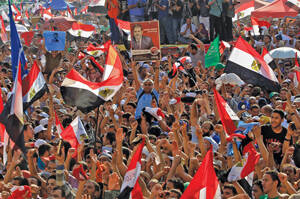Some of Egypt’s Christians are concerned about Islamists in power, but there is greater freedom of speech than before the revolution, said the pope’s ambassador to the Middle Eastern country. “I think there is a greater freedom now, though they accuse the present regime of also clamping down on people, on trying to control the press...so they say that the president is becoming a pharaoh,” said the Vatican nuncio, Archbishop Michael Fitzgerald, describing the mood of Egypt’s Christians.
“Christians are feeling uncomfortable, and certainly the Salafi group,” an ultraconservative sect of Islam, “is showing...disrespect for Christians,” he said during a visit to Washington in mid-October. “There are complaints, and I would say they are genuine complaints.” The archbishop said that often what begins as a conflict over property or family affairs turns religious and “ends up with people having their houses burned or their shops destroyed or their place of worship also attacked.
“It’s easy to arouse a group of Muslims against the Christians, and there can be also a reaction on the Christian side,” he said, adding, “The thing is that people are rather hot-tempered and they don’t reason very much before they react.” When there is a problem, he said, Christians feel “that the security forces don’t come in time, they always come late, and very often they hold reconciliation sessions, and the Christians are always the losers.”
After President Hosni Mubarak of Egypt was ousted in February 2011, an Egyptian military council assumed broad powers. Sixteen months later, Mohammed Morsi of the Islamist Muslim Brotherhood was elected Egypt’s new president. Morsi has finished his first 100 days in office, and critics say he has not kept most of his promises about what he would achieve in that time. Morsi has pledged that he would promote equal rights for Egypt’s Christians and women. “Our Christian brothers, let’s be clear, are national partners and have full rights like Muslims,” Morsi said in May before his election. Egypt’s Christians, mostly Copts, account for about 10 percent of the country’s 82 million people.
Egyptians also are awaiting a court ruling on whether the assembly drafting the country’s new constitution is legal. Members of Parliament chose members of the assembly, and some Egyptians argue that the assembly does not reflect all sectors of society. The court has said it will issue its ruling on Oct. 23.
Archbishop Fitzgerald said these were signs of emerging democracy: “Certainly people are ready to criticize the president and to say, ‘Look, you promised many things, and you’re not fulfilling your promises.’” He said he is trying to encourage Christians to participate in the new democracy, although some express fear for what the future holds for their children.
“My own message to them has been: Look, there is a new spirit of democracy, and you have to build on that,” he said. “Though the Islamists are in power now, this doesn’t mean to say that they will always be in power. This depends on you.”








